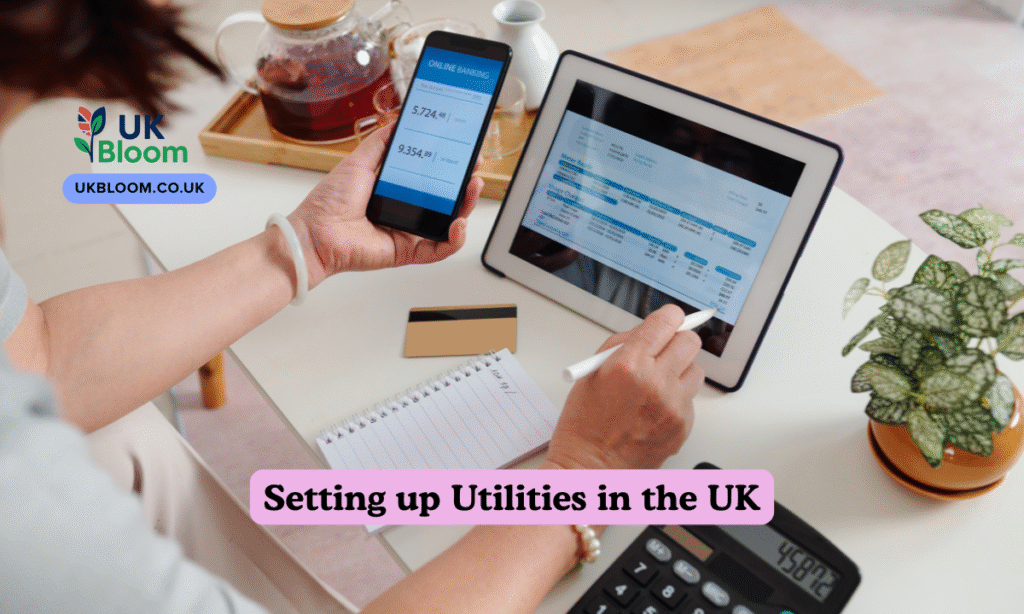At UKBloom, we understand that moving to the UK is a big step filled with excitement and a long to-do list. One of the most common questions we hear from our readers is: “How do I set up utilities in the UK?” Whether you’re arriving for work, studies, or a fresh start, getting your home connected to essential services is a key part of settling in. This guide will walk you through each stage, explain your options, and share tips to make the process easy and stress-free.
Setting up Utilities in the UK
Utilities are essential services that keep your home running. In the UK, the main household utilities include:
- Electricity
- Gas
- Water and sewerage
- Internet and broadband
- Council tax
- TV licensing
Setting these up early ensures a smooth and comfortable start in your new home.
Understanding UK Utility Providers
Unlike some countries with state-run utility companies, the UK has a competitive energy market. This means you can choose your supplier for most utilities, allowing you to find the best rates and services for your needs.
Key Points About the UK Utility Market
- Electricity and gas: Multiple suppliers, often bundled together for convenience.
- Water/sewerage: One regional provider per area.
- Internet/broadband: Choice of providers based on location and speed.
- Council tax: Paid to your local authority.
- TV licence: Required to watch live TV or use BBC iPlayer.
Step-by-Step: Setting Up Electricity and Gas
Step 1 – Check Existing Supplies
When you move into a new property, the gas and electricity are usually already connected. The previous tenant or homeowner will have had an account with a supplier.
Checklist:
- Locate your electricity and gas meters.
- Take meter readings on move-in day.
- Identify the supplier currently providing the service.
Step 2 – Contact the Current Supplier
Contact the supplier to inform them you are the new occupant. They will set up an account for you, usually on a standard variable tariff. You’ll need to provide:
- Your name
- Move-in date
- Meter readings
UKBloom Tip: Don’t delay this step — you might be liable for any usage from your move-in date.
Step 3 – Compare and Switch (If You Wish!)
You are not obligated to stay with the current supplier. Use comparison websites like Ofgem’s Energy Compare (official regulator) or MoneySuperMarket to explore your options for better deals, green energy, or fixed rates.
- Key factors to compare include price, contract length, green credentials, and customer service ratings.
- Switching is usually free and takes 2–3 weeks.
- There’s no risk of losing supply during the transition.
Example:
Many students in London find that switching providers for the first time can save them up to £200 per year compared to default tariffs.
Step 4 – Setting Up Payment
Suppliers generally offer:
- Direct debit (often the cheapest)
- Pay-as-you-go meters (good for budgeting)
- Monthly, quarterly, or online billing
Be sure to provide regular meter readings or set up a smart meter to avoid estimated bills.
Water and Sewerage: What You Need to Know
Unlike electricity and gas, you cannot choose your water supplier. Each region has a single company responsible for water and sewerage.
Finding Your Provider
- Ask your landlord or letting agent for provider details.
- Use the Water UK website’s “Find Your Supplier” tool for your postcode.
Setting Up an Account
Contact the regional water company with:
- Your address
- Move-in date
- Meter reading (if applicable)
Water is often billed either:
- At a fixed rate (based on property size), or
- By meter (pay for what you use)
Tip: If your home has a meter, submitting readings can help you spot leaks or excess use early.
Internet, Broadband, and Phone Lines
High-speed internet is vital for work, study, and daily life. The setup process can vary depending on whether there is an active line or if you need installation.
Key Broadband Providers in the UK
- BT
- Virgin Media
- Sky
- TalkTalk
- Plusnet
- Vodafone
Choosing a Package
Consider:
- Contract length (usually 12–24 months)
- Speed required (streaming, video calls, gaming)
- Bundle offers (TV, phone, mobile)
- Setup fees
Use tools like our UKBloom Broadband Comparison Guide (internal link to be added) to compare options.
How to Sign Up and Install
- Check availability in your area using provider websites.
- Place your order online or by phone.
- Installation: Some homes need a visit from an engineer, which can take 1–2 weeks, so book early.
- Activation: You’ll receive a router and instructions for setup.
If you’re sharing a house or flat, discuss with housemates and agree on package and payment splits.
Council Tax: An Essential for UK Residents
Council tax funds local services like rubbish collection, policing, streetlights, and community programs. Nearly everyone must pay this annual bill to their local council.
How Much Is It?
- Varies by location and property value (banded system).
- Students may be exempt; discounts are available for single occupants or certain low-income residents.
Setting Up Your Council Tax Account
- Visit your local council’s website (use the gov.uk “Find Your Local Council” tool).
- Inform them of your move-in date and who lives in the property.
- Request discounts or exemptions if eligible.
More details can be found in our UKBloom Council Tax Guide (internal link to be added).
TV Licence: Do I Need One?
If you watch or record live television or use BBC iPlayer, you need a TV licence. It covers any device, not just TVs.
Cost and Setup
- The current fee is £159 per year.
- Apply online via the official TV Licensing website.
- You may not need one if you only use streaming services (check eligibility).
For more on TV licensing, visit the official TV Licensing site.
UK Utility Set-Up for Different Living Arrangements
Renting a Room vs. Whole Property
- If you’re renting a room, utilities may be included — check your tenancy agreement.
- For entire flats or houses, you’ll usually be responsible for setting up accounts.
Students
Full-time students are exempt from council tax and may share utility accounts across multiple housemates.
Short-Term Lets and Hostels
These often include all utilities in the rent. Always confirm before moving in.
Top Tips for Managing Utilities in the UK
- Set up direct debits to avoid missed payments.
- Keep copies of all agreements and account details.
- Submit readings regularly or ask about smart meters.
- If you move out, notify all providers to close your accounts.
- Use budgeting tools (like the UKBloom Newcomer Budget Calculator) to plan monthly costs (internal link to be added).
Real-World Example
Sarah, a recent graduate from Malaysia, moved to Manchester for her first job. She took meter readings on her first day, called the existing electricity supplier to set up an account, and used a comparison website to find a better tariff within the first month. She set up broadband a week before moving in, so it was ready on day one — making her start in the UK comfortable and stress-free.
Useful Resources
- Ofgem’s official Energy Compare tool for comparing suppliers.
- Water UK’s Find Your Supplier.
- UK Government’s Find Your Local Council.
Frequently Asked Questions (FAQ)
Do I need to set up new utility connections if I move into a rental property?
Usually, utilities are already connected. You just need to contact the existing supplier, provide your details, and take a meter reading. If utilities are included in your rent, your landlord will handle the accounts.
Can I switch utility providers as soon as I move in?
Yes, unless you are tied to a supplier as part of your tenancy agreement. It’s best to take over the current account first, then shop around for better deals.
What if I can’t find the utility meters?
Ask your landlord or letting agent for help. Meters are usually in a cupboard, basement, or communal area for flats.
How do I avoid estimated bills?
Submit regular meter readings or install a smart meter so your bills match actual use.
H3: Are there any financial support schemes for newcomers?
There are schemes for low-income households, such as the Warm Home Discount for energy bills. Check provider websites or speak to your local council for help.
Conclusion
Setting up utilities in the UK may seem overwhelming at first, but with the right guidance, it’s a straightforward process. Remember to take readings, contact suppliers early, and use comparison tools to get the best deals. At UKBloom, we’re here to help you every step of the way! Explore our guides on council tax and broadband comparisons for more newcomer-friendly advice.
Disclaimer:
This article is for informational purposes only and does not constitute legal or immigration advice. Please refer to official UK government sources or seek legal support for specific guidance.






